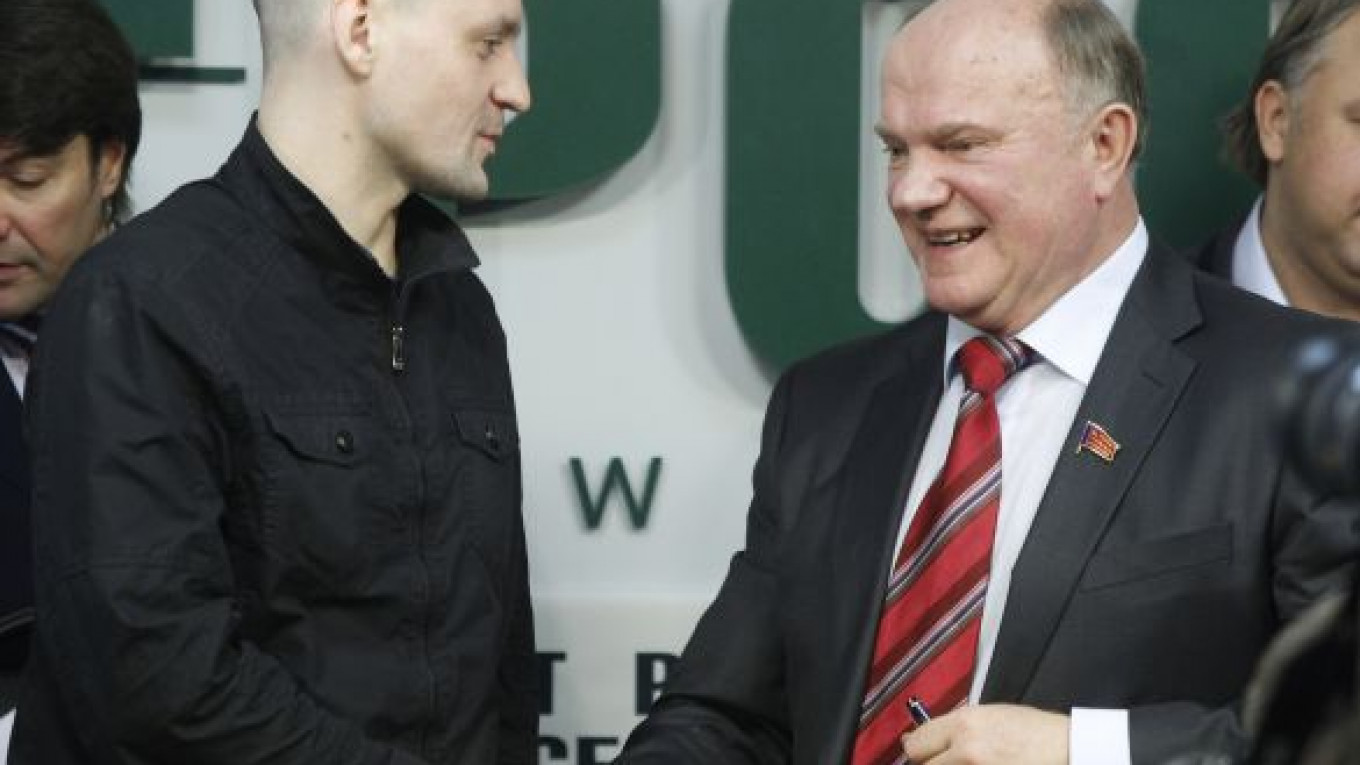Communist leader Gennady Zyuganov agreed Tuesday to implement a series of demands put forth by opposition protesters, if he is elected president in the March 4 election.
Zyuganov signed an agreement by Vadim Kuzmin, the chairman of a pro-Zyuganov public council, and Left Front leader Sergei Udaltsov, who drafted the platform — marking the first concrete merger between street protesters and leaders of the so-called "established opposition," who have neither appeared at the protests nor previously embraced their demands.
The 11-point agreement includes many demands that seem to enjoy widespread support among protesters — mostly educated, middle-class urbanites, who staged two large rallies following Duma elections that were marred by allegations of fraud. The points include freeing political prisoners, firing elections commission chief Vladimir Churov, carrying out new Duma elections and restoring direct elections for governors.
More radically, under the agreement Zyuganov pledged to change the Constitution to transfer power from the executive to the legislative branch, reduce the presidential term from the current six years and call an early presidential election next year. But Udaltsov later Gazeta.ru that Zyuganov refused to promise to call an early election in 2013 if he won the Kremlin.
Reached earlier by telephone, Udaltsov said he was tentatively throwing his support behind Zyuganov as the most likely candidate to force Putin into a runoff. He said he welcomed other candidates — except Liberal Democratic Party leader Vladimir Zhirinovsky, whom he refused to endorse — to join Zyuganov in agreeing to carry out the reform platform if elected president.
Zyuganov is polling at 9 percent, according to the latest survey of likely voters published by the Levada Center. This ties him at second with Zhirinovsky and 33 percentage points behind Prime Minister Vladimir Putin.
The agreement, which is not legally binding, also stipulates an end to unofficial censorship of the media, free and fair Duma elections by 2013, direct Federation Council elections by 2014 and a reestablishment of Russians' right to hold national referendums.
Other Russia leader Eduard Limonov, who considered linking up with the Communist Party in the 1990s, dismissed the agreement as pointless. "Zyuganov won't win … and he doesn't really want to," he said by telephone.
A Message from The Moscow Times:
Dear readers,
We are facing unprecedented challenges. Russia's Prosecutor General's Office has designated The Moscow Times as an "undesirable" organization, criminalizing our work and putting our staff at risk of prosecution. This follows our earlier unjust labeling as a "foreign agent."
These actions are direct attempts to silence independent journalism in Russia. The authorities claim our work "discredits the decisions of the Russian leadership." We see things differently: we strive to provide accurate, unbiased reporting on Russia.
We, the journalists of The Moscow Times, refuse to be silenced. But to continue our work, we need your help.
Your support, no matter how small, makes a world of difference. If you can, please support us monthly starting from just $2. It's quick to set up, and every contribution makes a significant impact.
By supporting The Moscow Times, you're defending open, independent journalism in the face of repression. Thank you for standing with us.
Remind me later.






